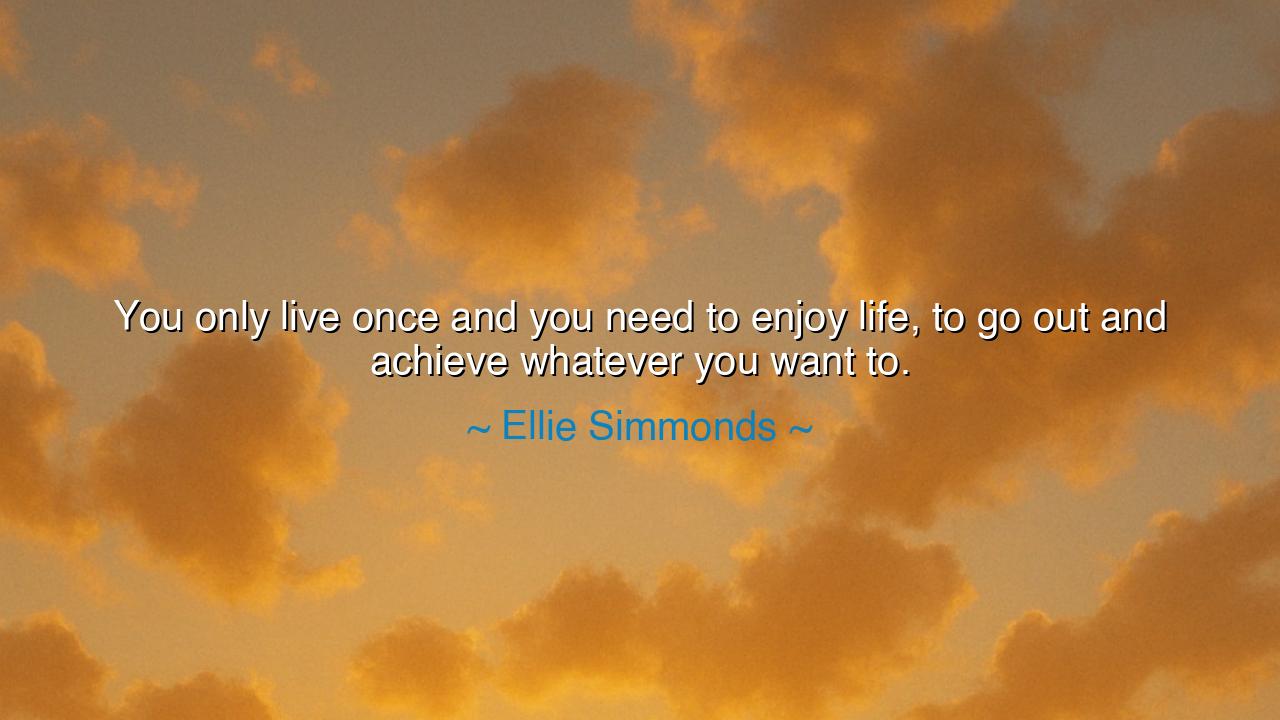
You only live once and you need to enjoy life, to go out and
You only live once and you need to enjoy life, to go out and achieve whatever you want to.






"You only live once and you need to enjoy life, to go out and achieve whatever you want to." These words from Ellie Simmonds, a champion swimmer and Paralympic gold medalist, carry a powerful message about the fleeting nature of life and the importance of seizing the moment. Simmonds' call to enjoy life and achieve everything one dreams of is a reminder that we should not waste our precious time, for it is limited, and each day is an opportunity to make the most of our existence. The underlying truth here is that life is not a rehearsal — it is the only act we are given, and it is ours to live with purpose, passion, and determination.
The origin of this perspective can be traced back to the ancient teachings of Stoic philosophers, particularly Seneca, who recognized the brevity of life and the need to live it wisely. Seneca wrote in his Letters to Lucilius, "Life is long if you know how to use it." This idea reflects a deep understanding of the value of time — not just as a commodity, but as the most precious resource we possess. For Seneca, life’s meaning is not found in the accumulation of wealth or the pursuit of status, but in the quality of the moments we live. He teaches that by embracing purposeful living and self-awareness, we can ensure that our lives are not squandered but used for the highest and most fulfilling purposes.
Similarly, Socrates also emphasized the importance of making the most of our limited time. His famous dictum, "An unexamined life is not worth living," calls us to reflect on the choices we make and the path we walk. Just as Simmonds encourages us to achieve our dreams, Socrates urges us to live in a way that is deeply connected to our values and our potential, not merely following the motions of life without questioning our actions or desires. Both philosophers and Simmonds remind us that life’s richness is found when we actively engage with it, pursue our goals, and make meaningful contributions to our own growth and the world.
Consider the story of Helen Keller, who, despite being both deaf and blind, refused to accept the limitations placed upon her. Helen’s life is a testament to the idea of living life to the fullest, despite facing incredible obstacles. She went on to become an activist, author, and lecturer, achieving more than most people would dare to dream, regardless of their circumstances. Keller’s life was defined not by what she couldn’t do, but by the relentless pursuit of what she could. She embodied the very essence of Simmonds’ words: to live, to enjoy, and to achieve whatever one desires, no matter the challenges that lie ahead. Keller’s story exemplifies the transformative power of embracing life fully, just as Simmonds encourages.
In more contemporary times, Steve Jobs, the co-founder of Apple, embodied the idea of living once with the pursuit of greatness. Jobs famously said, "Your work is going to fill a large part of your life, and the only way to be truly satisfied is to do what you believe is great work. And the only way to do great work is to love what you do." Like Simmonds, Jobs recognized that life is short, and the pursuit of one’s passion is the key to living with fulfillment. His journey was not without hardship, but his commitment to innovation, vision, and self-belief drove him to change the world. Jobs, like Simmonds, serves as an example of how the essence of living lies in finding your purpose and pursuing it with relentless determination.
The lesson from Simmonds’ words is clear: life is fleeting, and we are all given only one opportunity to make it count. While obstacles may arise, and the journey may be difficult, it is in the pursuit of joy, purpose, and achievement that we find true fulfillment. Her message speaks to the importance of overcoming fear and doubt to chase after our dreams. Like the ancient philosophers, she reminds us that living fully is not just about existing, but about striving toward something greater, something that aligns with our deepest values and passions.
To apply this wisdom in our own lives, we must first acknowledge the brevity of life. We should evaluate what truly matters to us, what dreams we are called to pursue, and what legacy we wish to leave behind. It is not enough to merely exist — we must actively engage with life, enjoying every moment, learning from every challenge, and achieving what we are capable of, just as Simmonds does. Each day presents us with an opportunity to move closer to our goals, and it is our choice to make the most of the time we have. As we face life’s uncertainties, let us be reminded of the words of Simmonds and the wisdom of the ancients: that we must live intentionally, embrace each moment, and make every effort to create the life we desire.
Ultimately, Skip Marley’s words remind us of the importance of joy in life. We must not wait for some distant future to enjoy the journey; we must live fully and embrace the pursuit of our goals. Life is fleeting, and only by daring to go after what we truly want can we experience the depth and richness of our existence. Let us take this wisdom to heart and step into each day with purpose, courage, and a commitment to living a life that is truly ours to create.






AAdministratorAdministrator
Welcome, honored guests. Please leave a comment, we will respond soon